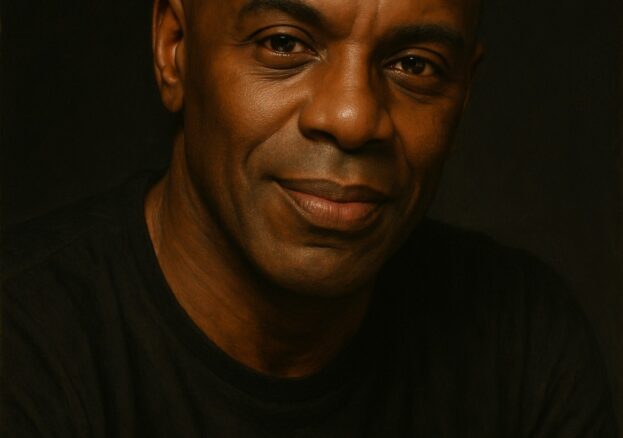
On weeknights in the 1990s, long before playlists were algorithm-driven, a generation of British listeners leaned in to their radios to hear a warm London voice introduce sounds they didn’t yet have names for—new jack swing, neo-soul, R&B that crossed the Atlantic and took root in British lives. That voice was Trevor Nelson’s. Calm, curious and unmistakably confident, he didn’t just play records; he earned trust. If Trevor said it was worth your ears, you listened.
Trevor Ricardo Nelson was born on 7 January 1964 in Hackney, East London, to parents of St Lucian heritage. His childhood was filled with the music of the Caribbean—calypso and reggae pulsing at family gatherings—but also with the sounds of imported American soul and R&B. Like many young Black Britons of his generation, Nelson grew up in a society that often failed to reflect his experiences, but music offered connection and belonging. At school he was determined, though it was outside the classroom, in record shops and on dancefloors, where he discovered his true calling.
As a teenager, Nelson began to DJ at parties and build his vinyl collection, developing an instinct for what moved a crowd. By the mid-1980s he was immersed in London’s underground music culture, running the Madhatter sound system and organising warehouse parties. He also worked in record retail, sharpening his encyclopaedic knowledge of artists and genres. His first professional break came when he joined Cooltempo Records, part of EMI, where he worked in promotions and later in A&R. There he played a part in developing the careers of artists such as Mica Paris, D’Angelo, and Lynden David Hall, learning the industry from the inside and understanding how to bring underground sounds to wider audiences.
But it was in radio that Nelson truly found his voice. He joined Kiss FM while it was still a pirate station, broadcasting illegally but passionately across London. When Kiss was awarded a legal licence in 1990, Nelson became one of its daytime DJs and even a director of the station. His shows were must-listen events, blending R&B, soul, and hip-hop with a knowledge and passion that made listeners feel part of something bigger. For many, it was the first time their music, their culture, and their voices were treated with seriousness on the British airwaves.
Television soon followed. In 1998, Nelson began hosting The Lick on MTV Base, the first long-running UK show dedicated entirely to R&B and hip-hop. Sunday nights became sacred for fans who finally saw the artists they loved—Mary J. Blige, TLC, Destiny’s Child, D’Angelo—given a proper platform. For emerging UK acts, an appearance on The Lick was a career milestone, a chance to stand shoulder to shoulder with international stars. Nelson became not only a presenter but a cultural guide, showing a new Britain what it meant to take Black music seriously.
In 1996, Nelson had already joined BBC Radio 1, presenting the station’s first national R&B show. His presence signalled a shift at the BBC: this music, once dismissed as specialist, now had a central place in national broadcasting. Later, he was instrumental in the launch of 1Xtra, the BBC’s first station built around Black music and culture, helping to shape its identity and mentoring younger DJs and producers. His shows were always curated with care: rather than chasing trends, Nelson gave songs space to breathe, treating them as part of a rich lineage rather than disposable hits.
Over the decades, Nelson has also remained a club DJ, bringing the same sensitivity to live crowds that he honed in his early years. His compilation albums—including The Lick, Soul Nation, and The Trevor Nelson Collection—have become staples, introducing listeners to both classics and hidden gems. They are more than playlists; they are archives of feeling, tracing the grooves of joy, heartbreak, and resilience through Black music.
Recognition has followed. He has won multiple MOBO Awards for Best DJ, was awarded an MBE in 2002 for his services to music and youth volunteering, and was inducted into the Arqiva Hall of Fame in 2014. His compilations and live sets continue to shape the soundtracks of British lives, proving that curation with care can be as influential as any performance.

For Black History Month, Trevor Nelson’s story is more than a biography. It is a chapter in the wider history of Black Britain’s cultural journey. He represents the moment when the sounds of community halls, pirate stations and record shop back rooms moved into the national spotlight. He proved that Black music belonged at the centre of British life, and that its curators could carry authority without compromise. In doing so, he opened doors for future generations of broadcasters, artists, and listeners who saw themselves reflected in the music he championed.
Trevor Nelson remains one of the defining voices of modern Britain—not just because of the songs he played, but because of the space he made. His career is a reminder that music is not only entertainment but history, culture and belonging, and that sometimes a single voice on the radio can change the way a nation listens.
Further Reading & Sources
- Wikipedia: Trevor Nelson — comprehensive biography, career details, awards and honours.
- National Portrait Gallery (UK) — short profile and portrait of Trevor Nelson.
- The Black Music Record Shop: Trevor Nelson — context on his role in UK Black music history.
- BBC Radio 1Xtra & Radio 2 pages — current shows and archives of his programmes.
- The Guardian & The Independent interviews — insights into his broadcasting philosophy and cultural impact.
- Resident Advisor & RA DJ Biographies — career overviews and industry recognition.
